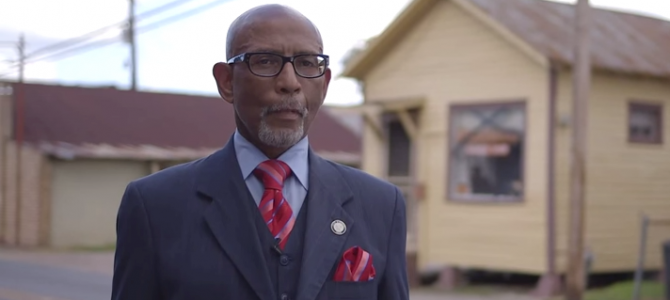Elbert Guillory has just shown us the way forward.
Guillory is a Louisiana state senator who caused a stir last year when he switched from the Democratic Party to the Republican Party. That would not have been news if Guillory were white; in fact, he would have been pretty far behind the curve. But Guillory is black and represents a poor black district, which makes his spirited defense of the Republican Party much more significant.
Now Guillory is back with a stunning new ad which doesn’t just criticize incumbent Senator Mary Landrieu—Guillory supports her challenger, Bill Cassidy—but also dismantles the Democratic Party entire claim to the black vote.
This ad immediately needs to be given massive funding and run in a continuous loop on Louisiana television for the next month.
Guillory himself is exactly the kind of spokesman the Republican Party needs to recruit on the national level. He will be running for lieutenant governor of Louisiana next year, which should give him a good platform.
The power of Guillory’s message comes from a combination of the quiet dignity of his manner (he has an air of old-fashioned Southern formality), his roots in a down-at-heels black community, and the clear failure of the big promises made to blacks on behalf of the welfare state.
That’s the key issue. Since the launch of the Great Society, Democrats have thrown money into the welfare state, specifically promising that this would lift blacks out of poverty. Fifty years later, it is hard to claim that this has achieved any of what it claimed it was supposed to do.
The results are particularly bad in the big cities. I noted recently that the reason Democrats think income inequality is such a winning political issue is because the districts they control have been turned into two-tier class societies divided between a small enclave of upper-middle-class whites and vast blighted areas where poor black and Hispanic people live. Megan McArdle notes a similar way in which New York City has stratified itself by chasing the middle class into the suburbs while providing subsidies that keep the poor in the city without really ameliorating their condition.
So the federal welfare state and Democratic management of the big cities has not helped poor blacks; it has merely herded them onto vast urban reservations where their function is to serve as reliable political clients of the Democratic Party.
I have described this as the Southern Strategy in Reverse:
From the 1970s to the 1990s, the Republican Party flipped the votes of Southern whites—but they neglected and comprehensively lost the black vote. Now Democrats are hoping to hold onto their death-grip on minority voters, and they are counting on this vote to rise—but they are pursuing this strategy at the expense of throwing away the white vote. I’m not sure that this quite captures the awfulness of the whole “coalition of the ascendant” strategy. Because it hitches the Democratic Party’s future to voting based on racial and ethnic loyalties, it is basically a strategy that consists of playing the race card from now until the end of time.
As despicable as this strategy is, it is also contains the seeds of its own destruction. The more dependent Democrats become on the racial vote, the more vulnerable they are if they lose any of it.
The right needs a new Reverse Southern Strategy, if you will, a strategy to convert black voters by finding and promoting leaders who can speak to them convincingly about the failure of the Democrats’ welfare state—which, when you think about it, is a phenomenon so broad and vast that it can’t be ignored forever.
Elbert Guillory has just shown us the way.
Follow Robert on Twitter.








